#this is mostly about 'their queer identity was a phase' but this can apply to so much
Explore tagged Tumblr posts
Text
Petition to rename people who "just went through a phase" into moon people. Phases are beautiful - you don't punish the moon when it has gone from full to waning. Why would punish people for the same thing?
#queer#lgbt#lgbtq#this is mostly about 'their queer identity was a phase' but this can apply to so much#to be a person is to die a thousand deaths and be reborn again. this is inevitable.#and the sooner you accept this the sooner you can actually start being *alive*#there is no death without life and no life without death and we must never neglect this#if parts of your identity were truly a phase then i for one am so happy for you (this is genuine)#i have never seen a convincing argument as to why we ought to punish those who 'went through a phase'#like oh no... (/sarcastic)#my cisness was a phase and i don't think i should be punished for it! same for literally any facet of identity#this is also a general lighthearted post and not meant to be taken as gospel or literal#my main focus is the desire to change the way people engage with the idea of human growth
87 notes
·
View notes
Note
for some reason, im having a really hard time acceptimg that im nonbinary.
all my life ive acknowledged and loved nonbinary people, ive supported genderfuckery and defended people with weird genders through and through, but when it comes to myself, its hard. i think something in me internalized that one day ill have to “grow up” and choose, so that peopld will stop saying its a phase and take me seriously.
ive thought up and down about what kind of person I want to be so I could “settle” on them. feminine woman, or masculine man. even then, i kmow i dont have to choose between those— masculine woman, or feminine man? the problem is…. all of those sound appealing!!!! i want to be all four!!!!!
despite my efforts to deconstruct the binary in my mind (i honestly think a lot more people would be nonbinary if it werent for the suffocating weight of societal norms), i still feel the need to choose. there is no “androgyny hormone” i can take. its E or T and im scared of both.
i guess it co-insides a lot with my sexuality. i heavily suspect im pansexual but i go through moments where im like, “do i even like men?” “wait, i dont like girls” “no im a lesbian” “no im a gay guy” “goddamnit i dont want to be either, fuck this, im aroace” “oh wait nevermind i like guys again”. i dont really relate to most gay mens experiences but i dont know if i relate to lesbians either. im afab and gendernonconforming and because of that almost everyone thinks im a lesbia, but when i think about being in a lesbian relationship it doesnt feel right? like, i know i dont have to be a woman to be a lesbian or a man to be gay, maybe its the fact that i mostly only peer into cisfem lesbian and cismasc gay spaces…. but i dont know. neither feel appealing. im scared ill have to choose :(
you don't have to compromise or choose anything that isn't right for you! there is no one right way to be non binary. non binary people don't even have to take hormones if they don't want to. there's no reason you'd have to. and you don't have to choose any terms like lesbian, gay, etc. if you feel those don't apply to you, either. those can be seen as a binary and if you don't fit inside of that, you don't have to exist there. you can just be "queer", it's a catchall that can mean different things to different people :)
there's no right or wrong way to be non binary, you don't have to make any fast and hard decisions in order to be that gender. it also doesn't matter what other people perceive you as- closeted trans boys are perceived as women, and that doesn't make them that. same logic applies to you. maybe masculinity fits you for a while and then it does it. maybe you dress a certain way for a while and move on to another form of presentation. identity is not static, it molds to its owner with time and use.
it takes time for anyone to figure these kinds of identities out, so there is no rush and you're allowed to try a term and see if it fits, and if it doesn't, move on to another. there's no guide to being non binary, so we all navigate it differently. it takes time for the pieces to fall into place. feel free to ask any more questions you may have! good luck figuring things out
21 notes
·
View notes
Text
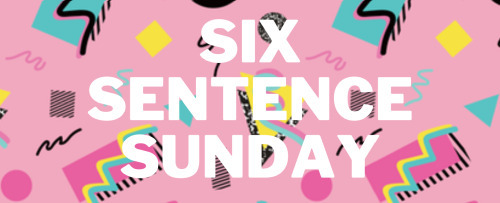
It’s bloody Sunday. Hewwo everyone and thank you @you-remind-me-of-the-babe, @thnxforknowingme, @martsonmars and @larkral for the tags, hi back @cutestkilla and yes @caramelcoffeeaddict I am indeed tagging you!
To no one’s surprise, I have written nothing apart from my thesis. On Thursday I basically went “into the zone” (my teacher would apply the flow theory here) and I wrote for 3.5 hours and ever since Thursday I have been adding stuff, but it is mostly done. Mostly. I only need to do the more general theory on representation, but since it isn’t specifically queer, I care less lol. Basically right now my theoretical background is “Representation” (basic stuff), “Queer representation” (the consequences of queer rep, the history of queer rep, gay assimilation vs. queer liberation, queerbaiting, heteroflexibility, Bury Your Gays, intersectionality) and lastly “the queer gaze” (queer reading of texts, positive queercoding, queer female fandom).
But uhm, I am actually super duper proud of my work, so ¯\_(ツ)_/¯ have some stuff about why there might be more queer men in media than queer women:
First, gender is generally still portrayed in a skewed way: there are more men in the media than women (Daalmans et al., 2017; Gallagher, 2014). Second, intimate relationships between two female characters are more often seen as something platonic (Russo, 2014). As an extension of this, women who sometimes enter into relationships with other women are not portrayed as queer, but as heteroflexible (Annati & Ramsey, 2022; DeCeuninck & Dhoest, 2016; Diamond, 2005; Jackson & Gilbertson, 2009). This means that relationships between two women are portrayed as a joke, a phase, a party trick, or as a way to attract male viewers (Diamond, 2005). This heteroflexible portrayal is not necessarily a bad thing, as it can also promote the beginning of a discovery of a queer identity (Symes, 2017), but most often a heteroflexible storyline ends with a woman being affirmed that she is straight and therefore she is not a threat to the heterosexual order (Jackson & Gilbertson, 2009). This is also consistent with the 1990s “lesbian chic” movement, in which sexual relations between straight women were presented as a fun, provocative trend (Dow, 2001; McNicholas Smith, 2020).
These are actually six sentences. Original is under the cut.
Will y’all ever be able to read this? Who knows. People, both online and offline, have expressed interest, which delights me. There is a thesis repository at my university, but a) my thesis is unfortunately in Dutch and b) I am using a copyrighted cartoon. I actually have permission to use it from the cartoonist (fuck yeah), but I obviously only asked permission for the use within my faculty so I’ll have to e-mail her again.
And now, the weather: @quizasvivamos @blurglesmurfklaine @coffeegleek @esperantoauthor @otherworldsivelivedin @sillyunicorn @bazzybelle @dragoneggos @raenestee @tectonicduck @nightimedreamersworld @urban-sith @captain-aralias @takitalks @justgleekout @cerriddwenluna @tea-brigade @ivelovedhimthroughworse @moodandmist @whogaveyoupermission @bookish-bogwitch @confused-bi-queer @aroace-genderfluid-sheep @ionlydrinkhotwater @1908jmd @special-bc-ur-part-of-it @chen-chen-chen-again-chen @nausikaaa/@wellbelesbian @artsyunderstudy @facewithoutheart @shrekgogurt @boyinjeans
The Dutch one:

#i also got super ill over the weekend#yesterday was painful but today was fine and i decided to relax by playing stardew valley and reading#i finally finished magnus chase!!#also re: thesis i am sharing the shit out of this but obvs for *gestures around* privacy reason i assume i cannot easily share the results#and snippets of the interviews#actually.... i do not know the rules about sharing this kind of stuff#cause i do know that if you are a respondent you can always leave your e-mail address#so that i can send the final results#hmmmmmmm#six sentence sunday#tagged in#thesis lol
24 notes
·
View notes
Text
on fujoshi and fetishization
Lately, more and more, both here on tumblr and on other sites, I keep seeing people spew unfiltered hatred at fujoshi - that is, women who like mlm content such as gay fanfic and fanart featuring men with other men. And I don’t mean like a specific type of fujoshi, like the ones who are genuinely being weird about it, but just like a general hatred for girls (but especially straight identifying girls) who express love for gay romance.
I hate to break this to you all, but women (including straight women!) actually are allowed to like mlm fanfiction and fanart, even enthusiastically so. A woman simply expressing her love of gay fanfic, even if it is in kind of a cringey way or a way that you personally don’t like, is NOT automatically fetishization.
I’ve been on the receiving end of fetishization for my entire life, from a very young age, as many black and brown folx have, so I consider myself pretty well acquainted with how it works. Fetishization isn’t just like, being really into drawings of boys kissing, or whatever the fuck y’all are trying to imply on this god forsaken site.
Fetishization is complicated imo, and can encompass a lot of things, such as (but not limited to):
1 - dehumanization, e.g. viewing a group of people as sexual objects who exist purely for entertainment purposes, rather than acknowledging them as actual people who deserve respect and rights
and
2 - projecting certain assumptions onto said people based on their race/sexuality/whatever is being fetishized. These assumptions are often, but not always, sexual in nature (like the idea that black people in general are more sexual than other races, etc etc etc).
I’m going to use myself as an example to illustrate my point. Please note this isn’t the best or most nuanced example, but it is the most simplistic. A white person finding me attractive and respectfully appreciating my black features as part of what makes me beautiful is not, on its own, fetishization. A white person finding me attractive solely or mostly because I’m a PoC is now in fetishization territory. Similarly, assuming I’m dominant because of my blackness (like saying “step on me mommy” and shit like that) is hella fetishistic.
That being said, theres definitely a difference between how fetishization works in real life with real people, and how it shows up in fandom.
Fetishization manifests in many different ways in fandom, but most commonly on the mlm side of things, I personally see it appear as conservative (or centrist) women who love the idea of two men together, but don’t actually like gay people, and don’t necessarily think LGBT+ people deserve rights (or “special treatment” as its sometimes dog whistled). These women view queer men as sexual objects for entertainment rather than an actual group of people who deserve to be protected from systemic oppression. I’ve noticed that they often don’t even think of the men they “ship” together as actually being gay, and may even express disgust at the idea of a character in an mlm ship being headcanon’d gay. In case its not obvious, this is pretty much exactly the same way a lot of cishet men fetishize lesbians (they see “lesbian” as a porn category, rather than like, what actual LGBT people think of when we read the word lesbian). There’s a pretty popular viral tweet thread going around where someone explains seeing this trend of conservative women who like mlm stuff, and I have also personally witnessed this phenomenon myself in more than one fandom.
The funny thing is, maybe its just me buuuut.... The place I see this particular kind of fetishization happen most is not in the anime/BL fandom, from which the term fujoshi originates - I actually see these type of women way way more in western fandom spaces like Supernatural, Harry Potter, and Hannibal. I can’t stress this enough, there’s a shocking amount of people who are like, straight up trump supporters in these fandoms. If you want to experience it, try joining a Hannigram or Destiel group on facebook and you will probably encounter one eventually especially if you happen to be living through a major historical event. Like these women probably wouldn’t even be considered “fujoshi”, because that term doesn’t really apply to them given they aren’t in the BL/anime fandom, yet they’re the ones I personally see actually doing the most harm.
Of course this isn’t the ONLY kind of fetishizing woman in the mlm/BL world, there are other ways fetishization shows up, but this is the most toxic kind that I see.
A girl just being really into BL or whatever may be “cringe” to you, or she may be expressing her love for BL in a “cringey” way, but a straight woman really enjoying BL is not, on its own, somehow inherently fetishization. Yes, sometimes teenage girls act kind of cringe about how much they like BL and that might be annoying to you, but its not necessarily ~problematic~.
That being said, IT NEEDS BE REMARKED that a lot of the “fujoshi” that you all hate so deeply, are actually closeted trans men or nonbinary people who haven’t yet come to terms with their gender identity, or are otherwise just NOT cishet. I know because I was one of these closeted people for years, and I honestly think tumblr and the cultural obsession around purity is one of the many reasons I was closeted so deeply for so long. STORYTIME LOL!!! In my early adolescence, I was a sort of proto “fujoshi”. I identified as a bi girl who was mostly attracted to men, or as most (biphobic) people called it, “practically straight”. I wrote and read “slash” fanfic and looked at as well as drew my own fanart. We didn’t use the term fujoshi back then, but that’s definitely how I could have been described. I was obsessed with yaoi, BL, whatever you want to call it, to a cringe-inducing degree. I really struggled to relate to most het romances, so when I first discovered yaoi fanfics (as we called them at the time), I fell in love and felt like I finally found the type of romance content that was made for me. I didn’t know exactly why, I just knew it hit different. LGBT+ fanart and fanfiction brought me an immense amount of joy, and I didn’t really think too hard about why.
At some point, in my early 20s, after reading lots of discourse™ here on tumblr and other places like twitter, I started to get the sinking feeling that my passion for gay fanfiction was ~problematic~. I had always felt a sense of guilt for being into mlm content, because literally anyone who found out I liked BL (especially the men I dated) shamed me for liking it all the fucking time (which btw is literally just homophobic, like can we talk about that?). In addition to THAT bullshit, now I’m seeing posts telling me that girls who like BL are cringey gross fetishists who inspire rage and should go die?
Let me tell you, I internalized the fuck out of messages like this. I desperately wanted to avoid being ~problematic~. At the time, I thought being problematic was like the worst thing you could be. I was terrified of being “cancelled”, before canceling was even really a thing. I thought to myself, “oh my god, I’m gross for liking this stuff? I should stop.” I beat myself up over this. I wanted so badly to be accepted, and to be deemed a Good Person by the internet and society at large.
I tried to shape up and become a good ally (lmfao). I stopped writing fanfic and deleted all the ones I was working on at the time. I made a concerted effort to assimilate into cishet culture, including trying to indulge myself more deeply in the few fandoms I could find that had het content I did enjoy (Buffy, True Blood, Pretty Little Liars, etc). I would occasionally look at BL/fanfic/etc in private, but then I would repress my interest in it and not look for a while. Instead I would look at women in straight relationships, and create extremely heterosexual Couple Goals pinterest boards, and try to figure out how I could become more like these women, so I, too, could be loved someday.
This cycle of repression lasted like eight years. Throughout it all, I was performing womanhood to the best of my ability and trying to become a woman that was worthy of being in a relationship. I went in and out of several “straight” relationships, wondering why they didn’t make me feel the way reading fanfic did. Most of all, I couldn’t figure out why straight intimacy didn’t work for me. I just didn’t enjoy it. I always preferred looking at or making gay fanfiction/fanart over actual intimacy with men in real life.
Eventually, I stumbled upon a trans coming out video that someone I was following posted online, my egg started to crack, and to make an extremely long story short, after like 3 years of introspection and many gender panic attacks that I still experience to this day, I realized that I’m uh... MAYBE... NOT CIS..!? :|
I truly believe if I had just been ALLOWED TO LIKE GAY STUFF WITHOUT BEING SHAMED FOR IT, I probably would have realized I was trans way way sooner. Because for me, indulging in my love of gay romance and writing gay fanfic wasn’t me being a weirdo fetishist, it was actually me exploring my own gender identity. It is what helped me come to terms with being a nonbinary trans boy.
Not everyone realizes they are trans at age 2 or whatever the fuck. Sometimes you have to go through a cringey fujoshi phase and multiple existential crises to realize how fucking gay you are AND THATS FINE.
And one more thing - can we just be real here?
A lot of anti-fujoshi sentiment is literally just misogyny. omg please realize this. Its “women aren’t allowed to enjoy things” but, like... with gay fanfics. Some of the anti-fujoshi posts I see come across my dash are clearly ppl projecting a caricature they invented in their head of a demonic fujoshi fetishist onto any woman who expresses what they consider to be a little too much enthusiasm for gay content and then using their perception of that individual as an excuse to justify their disdain for any women, especially straight women, ‘invading’ their ~oh so exclusive~ queer fandom spaces.
god get over yrselfs this is gatekeeping by another name
idk why i spent so long writing this no one is even going to read it, does anyone even still use this site
*EDIT: HOLY SHIT WHEN DOING RESEARCH FOR THIS POST I FOUND OUT THAT Y-GALLERY IS BACK OMG!!!
30 notes
·
View notes
Text
Stages in Coming Out
This is a way to think about the process of coming out to oneself and to others.
Not everyone experiences all these steps or not in the same way. And they’re not a straight line, people often take steps forward and then backwards before moving forward again.
Stage I - Growing Awareness
Sees themselves as heterosexual and cisgender (gender conforming) but start recognizing they’re different from other people because of thoughts, emotions, physical reactions, and other experiences.
Probably feel confused and experience turmoil.
If they weren’t before, they become aware of the existence of people with different gender identities or sexual orientations.
They begin to question their identity as straight and cis.
Am I different? Could I be gay? Who am I?
Perhaps they avoid situations that cause them to question their existing identity (”that’s not who I am”).
They could feel uncertain and search for information about trans or sexual identities.
Starts exploring why they feel positively or negatively towards these feelings.
Stage II - Exploration
When a person isn’t denying or rejecting their thoughts & feelings, they begin to come out of the "fog" and accept the possibility of being bi, gay, ace, trans, etc.
They’re coming to terms with the idea of having a minority gender or sexual identity and start thinking about the wider implications.
Maybe I am gay. What are gay people like? Maybe this does apply to me?
They might hold onto their hetero and cis identity even while accepting they experience some lesbian or non-binary feelings (”It’s only temporary” “it’s just this one person who makes me feel this way”).
Could start feeling loss for the things they will give up by embracing their sexual orientation or gender identity and work on passing as straight & cisgender with no intention of revealing their identity.
They may accept these feelings & thoughts are there, but see it as totally unacceptable, and they try to stop any behavior related to these thoughts. If attempts to inhibit behavior regularly fail, the shame they feel about this may lead the individual to attempt suicide.
Stage III - Tolerance
This is where an individual may begin to think “I am probably gay/lesbian/bisexual/transgender/etc.”
Their new identity is seen as something to tolerate, not embrace.
This is why many will maintain separate public and private images of who they are.
I accept the possibility that I may be gay. Am I okay? Where are other trans people?
They start to feel separated from their heterosexual or cisgender identity.
May have a sense they don’t quite fit in with other cis/straight people.
They might start seeking info about LGBTQ+ subculture, and wonder if they fit within the culture and the community.
In an attempt to lessen feelings of social alienation (others don’t understand what I’m going through) or loneliness, they seek out people who are part of the subculture (for example, going to their school’s gay-straight alliance club).
Stage IV - Acceptance
They are internalizing their sense of self as a gay, bi, lesbian, ace, trans, non-binary person and accepting themselves.
Now instead of tolerating this identity, they accept it.
They attempt to bring agreement between their private and public view of who they are by selectively coming out to others.
As people accept them, it helps legitimize themselves and they attach positive meaning to their queer identity.
They have more interaction or connection with the LGBTQ+ community.
I am a lesbian. I will be okay. I can come out to some people.
Disclosing sexuality/gender identity only to select individuals who will keep it confidential.
Exploring subculture activities, readings, etc.
Attempts to "fit in" and "not make waves" within the gay or trans community.
They may begin to have a preference to be around others who are LGBTQ+.
They see being identified as LGBTQ+ as fine in private, but not in public. But will start moving towards seeing their identity being publicly known as acceptable. This comes as they accept the potentially negative consequences of being out.
They learn about their internalized "homophobia" or “transphobia” and the consequences it has had on how they view themselves and the negative effects.
Stage V - Pride
Incorporating one's sexual identity into one's overall identity, it’s one aspect of who they are and how they understand themselves.
They see being LGBTQ+ as normal.
Typically they are "out" with friends & family, and at work.
More at peace with themselves and have an appreciation for this part of who they are.
Could feel frustration or anger at occurrences in everyday life when they feel they need to adhere to heterosexual/cisgendered norms.
I am a good person who happens to be gay. I'm happy to let people know who I am. I’m different and proud of it!
Accepting of supportive heterosexual/cisgender individuals.
They explore heterosexism and the role it has in their world and how to combat it.
They have Pride in who they are, in the journey they went through for acceptance and are proud to be a part of the LGBT community.
They’ve internalized positive feelings about their queer identity.
———————————————————————
I’m in a book club with a few LGBTQ people, but mostly it’s parents of LGBTQ kids and the friends of those parents.
Based on their questions, I realized they don’t understand what it’s like to come out. They just know the part where we announce that this is a part of us, they miss all the steps leading up to it. And straight cis people don’t have a similar experience in identifying and accepting their gender identity or sexual orientation, it’s not part of their reality.
As kids, most of us are taught that this is how the world works, boys & girls fall in love and get married and have babies. You’re a boy (or a girl) and that’s how your life will go. We accept it, that’s all we know, but then queer people have a growing dissonance and we have to discover that actually I am different, I don’t fit this story. I have believed this is who I am my whole life but maybe that’s not who I am.
Straight cisgender people just advance to the next step and then the next step of their path without ever having to say, “Wait a minute, there’s something off, I don’t think I fit. Am I broken? Why don’t I have the same feelings as everyone else?”
No wonder a lot of them think it’s a “choice” or that we’re going through a “phase.” From their perspective, we are straight & cis and always have been until the day when, out of the blue, we announce “I need to tell you something, I’m [lesbian, trans, nb, ace, gay, bi, etc].” I suppose to them it could look like we decided on this rather than we went through a long exploratory period to understand ourselves.
75 notes
·
View notes
Note
I would like to ask you all of the pride questions from that one post.
Dammit Steve XD
Gender and pronouns? Female and she/her are fine, as far as i know i’m cis. i don’t care if you call me dude, though. Dude can be anyone.
Romantic orientation? i use demi-whatromantic, with demiromantic as the microlabel. Most people know whatromantic as quoiromantic or quoi. i think what/quoi is typically known as a microlabel, but i relate to that more and feel it describes me more compared to demi which is why i focus more on that aspect.
Sexual orientation? In lamest terms? Asexual. In my terms? Stereotypical ace. In specific terms? S-x repulsed asexual.
Past labels you’ve used? i didn’t use anything before discovering asexuality because naive and oblivious, as far as i know. Before demi-whatromantic i briefly used demiromantic as a placeholder even though that didn’t totally feel right on its own.
How long have you been using your current labels? Asexual since late October 2017 and officially, or i guess out, since February 2018. Demi-whatromantic i think has been for maybe 6ish months now?
What made you pick your name? i had no say in my name lol. I haven’t changed it at all
What names have you gone by previously? Unless nicknames count for anything, just my regular boring name.
What names have you considered using? i’ve only ever considered using other names for me as a Pokemon trainer in the games which is obviously not the same. But, for the record, every time i start a game using the male trainer i’d use the name Larry.
Do you like your flag(s)? i don’t focus on the demiromantic flag as much, only because i feel less of the connection to compared to ace and what. The asexual flag has definitely given me a new appreciation for purple, but as a former art student i’ve been taught that black is typically the absence or color and white encompasses all the colors. so i do wish the ace flag had more colors just so i can stop referring to purple as the “only” color. i definitely appreciate and like the look of the whatromantic flag, but i don’t think as many people are aware of what it looks like or that it even exists. i especially love the shade of blue used in it.
Favorite flag(s) visually? Gonna be unoriginal and say the gay pride flag just because i love rainbows.
Favorite colors? Blue has always been a favorite of mine, and i used to gravitate mostly towards lighter shades of purple but now i just include purple in general.
Favorite animals? Puppies, kitties, bunnies, hamsters, monkeys, ponies.... Actually, probably best just to say adorable fluffy animals.
Favorite things about being LGBT+? i like having an explanation for being me. i don’t look my age to begin with and i definitely don’t act like it. So people assuming there’s something wrong with me mentally because of it, or wanting to avoid me in general.... i know people have their feelings about stereotypes and a lot of times it is negative, but for me knowing that a stereotypical ace basically describes who i am, it feels reassuring. And i like knowing that i don’t have to act or think or do completely of what’s expected of me because in a heteronormative world, being LGBT+ completely flips that around. Even if to me, it doesn’t always feel like i have a place because i don’t know many queer people and i don’t get involved in things in general, somewhere in my mind i know that there’s a place for me.
Are you dysphoric? Not that i know of.
Are you religious? Nope. i don’t fast, i don’t keep kosher, i don’t go to temple, i never went to Hebrew school.... But it doesn’t make me any less connected to my religion and, as selfish as it sounds, i still wanna make a point of it and remind people, hey us Jews exist, too!
Are you questioning your identity? Some parts of it i do question sometimes, mostly in terms of aesthetic attraction. But i fluctuate with including that attraction in my identity. And i do question how much, if at all it does or could play a part in my romantic attraction.
Are you in a relationship? Haha, funny. Nope.
Are you out of the closet IRL? For the most part, yes. It’s primarily in terms of saying i’m asexual or just queer, but part of that depends who i’m talking to, if or when it comes up in conversation, and how comfortable i feel talking to people about it.
Is your family supportive? i honestly don’t know if my extended family knows, even though i do post pride related things on my Instagram which some of them do follow and i have posted about it there. But, as annoyed as my mom can get with my ace jokes or comments sometimes, she accepts me for who i am and supports me, and has, probably before even knowing the term asexual existed, had an assumption a typical relationship happening for me was slim. And i know without a doubt that if my dad was still around he would definitely be supportive of me and not cared what i identified as, what i looked like, who i liked or didn’t like, or anything like that.
Favorite LGBT+ celebrity or historical figure? Neil Patrick Harris is definitely one of them, and i think another favorite is probably Demi Lovato.
Favorite LGBT+ couple IRL? Neil Patrick Harris and David Burtka. i love NPH and the family that he and David have are just the most precious things ever! Plus the way they go all out for Halloween every year? HELL. YES.
Favorite LGBT+ canon character? First one that comes to mind is Asami from Legend of Korra. Because Asami. Another one is Cyrus Goodman from Andi Mack. i loved watching his journey on the show and also knowing that there are kids who were watching Disney Channel that could not only relate to and look up to him as a queer character but also as a queer Jewish character. Plus he was just the most precious character and i just wanted to hug him!
Favorite LGBT+ canon fictional couple? Korra and Asami from Legend of Korra; Stef and Lena from The Fosters; Kat and Adena from The Bold Type.
Some characters you headcanon as LGBT+? Elsa and Honeymaren from Frozen 2. Don’t get me started, i will NEVER shut up. I’m going down with that ship.
Some LGBT+ pairings you ship? i know i already said Kat and Adena from the Bold Type. As of the current season they are - spoiler - not together and have not been done the justice to them as characters or their relationship. I continue to ship them, i love the chemistry the actors always have between them and how believable it is for their characters, and i’m just anxiously waiting for the day when they can hopefully FINALLY get back together.
Any celebrity crushes? If by crushes you mean celebrities i admire, look up to, think are cute, and would probably watch almost any show or movie if they were in it? Zendaya. The same has also applied to Corbin Bleu.
Any fictional crushes? As long as the same rule applies to the previous question and also includes being obsessed yet completely in control of that obsession and that character is also a muse for creativity? Elsa.
A trope you dislike about your identity? Probably that it’s a phase or i just haven’t met the right person yet. It took me probably too long to know let alone even understand why i didn’t think so much of romance or relationships and why i was never looking for or really wanting an actual relationship. For the most part, that’s been my whole life so to say my whole life is just some kind of phase or imply that i’m living it wrong? Just. No.
A trope about your identity that applies to you? Maybe this falls more under the stereotypical asexual label, but that aces can be very childlike. i’ve always been a kid at heart, i never really acted like my age, and yeah i can be really naive or clueless about a lot of things.
Something you wish people understood about your identity? Probably just that people understood it’s an actual identity. It’s not a choice, it’s not a phase. It’s not a label someone created just to be able to fit in somewhere or for sh-ts and giggles. It’s an actual, legitimate, real identity.
Something you dislike about being LGBT+? I feel like i can’t fully comment on it because sometimes i don’t fully feel LGBT+. Not having more than a couple of friends who identify as queer, not actively getting involved in the community or really wanting to be around people in general...i can only say what i dislike based on what i’ve seen online. And what i don’t like is that the LGBT+ community is supposed to be that - a community. It’s supposed to be a place where we can all relate to each other somehow, support each other and rely on each other. It’s supposed to be a place where, regardless of what label or how many labels we use, if we’re not straight it’s our place. We belong. But people still find a way to want to kick people out or treat people badly just because they don’t understand or agree on the label. Or maybe they don’t like or understand why someone chose a certain label or doesn’t have one at all or just uses queer. People still find a way to exclude and ignore and that’s not fair at all.
If you’re not cis, do you want HRT and/or surgery?
If you’re not straight, who was your first same-gender crush? Are we still going by either of my crush definitions from earlier....?
Do you align with any gay subcategories? (Butch/femme, bear/twink, etc.) Not that i know of. I don’t think i even know a lot, or maybe any of the subcategories at all besides those mentioned.
Do you have any LGBT+ idols? Elton John is the one that comes to mind. Knowing the life he had, the addictions he struggled with and ultimately overcame, becoming an activist and philanthropist especially for HIV/AIDS, growing up on his music... He dealt with a lot and has gone through so much but he’s come out so much stronger and has not only had a successful career but has also tried to do his part to help others for a cause that he believes in.
Do you own pride merch? Would you like to? A pride hat, 2 pride scarves, a few pride pins, an asexual lanyard.... i would definitely like to have a t-shirt with an ace pun at it at some point, though.
Do you have a type in partners? Probably water. Or were you talking about actual human partners and not Pokemon partners in the games?
Do you have a type in friends? i actually don’t think i chose any of my friends. As far as i can think of, all of the friends i do have came into my life kind of by accident or by chance and they’re the ones who have stuck around. i do think most of my friends though have senses of humors and are loyal, although the closest ones are definitely WAY more levelheaded than i am! XD
1 note
·
View note
Note
1, 3, 14, 30
1. what’s your gender?partially cis girl partially agender, mostly because I dont really take it up into much consideration and because i dont really get the whole gender binary thing when it’s applied to myself... so yeah, i dont know and i dont really ask myself either
3. is your family accepting?not really, my dad’s pretty against the whole Gay Lifestyle, and as much as she tries to be accepting my mom would probably have a hard time accepting a gay kid
14. are you openly out?no. i am out only to my boyfriend, my internet friends, and two of my friends from university. I am trying to move out so i can live that part of my identity a bit more tbh
30. any advice to someone who isn’t out or who is exploring themselves?you dont have to come out if you dont want to, there will be days in which youll want to scream it from the top of your lungs, but if there’s even a little bit of doubt that tells you that it might not be a safe choice to come out dont do it. and about exploring yourself: keep doing that, even when you’ve found an identity you feel comfortable with, keep putting yourself under a microscope. I have identified with ace, demi, queer, and bisexual... you never know where your heart guides you. whatever your identity may be at the moment, though, it’s never a phase and it’s never not valid.
1 note
·
View note
Text
Okay Rooster Teeth
“Spoilers for Red vs Blue season 15 up to episode 7 beneath the cut. It’s a long post.
From Lopez’s “Tumblr’s going to hate this” joke in Episode 15.6 I get that you’re all used to getting irrational flame and hate over the smallest things from Tumblr users. As someone who enjoys being on the website, even I can admit Tumblr has some seriously ugly parts to it, such as call out culture. Some people where will scream and rage and hate on anything they deem to be “problematic”.
This post will not be like that.
I have no idea if you guys will read this, or if you’ll take away what I hope you will from it. Even if you don’t, this doesn’t just apply to you. This applies to all content creators. This is something I both need from the content I consume and that I must be aware of when I create my own works.
In episode 15.2, Kaikaina Grif makes two “bi-phase” jokes. In episode 15.7, there’s a long gag about Tucker having fathered many child and is raising a fuss about paying child support, and is generally playing the part of the absent black father.
Both these jokes made me incredibly uncomfortable.
I wasn’t upset, not in the sense of being hurt by these jokes, nor was I angry. I watch more Rooster Teeth content than just Red vs Blue. I know from watching these other shows that you guys are good people who try to do good. I know that many of your employees are some form of queer, or PoC, or both. I’m aware that you try to be accepting of different faiths, sexulaities, and cultures. The atmosphere that you produce on your podcasts, behind the scenes, live shows, and at cons is one that is fun, easy going, accepting, and funny. It’s because I am aware of these things that I know that these jokes you make are just that. Jokes. You don’t mean harm by them. But both these jokes play on stereotypes that are legitimately harmful to those they are about.
I’ll start with Kai’s bi-phase joke first, as I am someone who is attracted to multiple genders. People who are bisexual, pansexual, polysexual, however they identify, and are attracted to multiple genders and sexs are treated with suspicion, looked down upon, and harassed by both heterosexual and homosexual people. Both groups tell them that they are “faking for attention”, “just going through a phase”, and / or “you’ll have to pick a side”. Many people say that they don’t want to date people who are attracted to multiple genders because they are more likely to cheat or carry STIs. People who are attracted to multiple genders often have their gender erased, “You’re dating this person, so right now you’re straight / gay”, and in media, characters who are confirmed attracted to multiple genders will not use terms like bisexual or pansexual, instead using phrasing such as “I like people”, or “I don’t like labels”, and these media characters often fulfil the stereotype of the cheating bisexual, or show a distaste for “being tied down”. For those who are heterosexual, this may not seem like a big deal but for those of us who are queer, we have a very important part of our identity denied on a near daily basis, so when many characters instead refusing to name their identity it can be upsetting. Having characters who represent us is hugely important because it shows we are not alone. It gives us someone to look up to. And, in a way that’s just really hard to explain properly, it just makes us feel good to see a character who’s like us. It makes us smile, it can make us cry.
Kaikaina Grif is a character who is very beloved by the community. Since we didn’t have too much canon facts about Kai to build our stories and art off, we had to do a lot of inventing on our own, but the core of Kai came from her actions in the Blood Gulch Chronicles. It was well accepted that Kaikaina Grif was bisexual, from her comment that Tex is badass and hot, and that that thought did not change upon realizing Tex was a woman.
When Kai showed up in the season 15 trailer, no one expected her to be exactly like we had written. We understood, in general, that there was going to be a difference between “fanon” and canon. But Kaikaina’s bi-phrase joke took a lot of us by surprised and took away one of the core things about Kai’s character. I understand that Kai is supposed to be a sexual, no filter character whose lines are often written to invoke the “wait, what?” gag, but the fact she was bisexual was important to many of us because of the above reasons. The bi-phase joke not only perpetuated the stereotype that bisexual people are “undecided”, it took away a character who represented us, and turned a character we love into just a joke. We knew Kai would not get the same level of characterization the main characters would. We understand what a side character is. But even minor characters, even in a mostly humorous show, shouldn’t have their sexuality reduced to a joke. Kai’s even more special than other side characters, because she’s related to one of the main characters!
This is why the bi-phase joke made me and many others uncomfortable. It showed yet again that people consider attraction to multiple genders to be something that no one takes seriously or understands.
The next joke is the long gag about Tucker having sired who knows how many children and is going to be the absent father for all of them while whining about paying child support. I want to preface this explanation by stating I am not a person of colour, I am white, so many of my feelings and thoughts on this come from my PoC friends and acquaintances. If anything I say is wrong or offensive, please let me know and I will do my best to correct it and myself.
Lavernius Tucker is another beloved character of the community. Many of us believe Tucker has had some of the most character growth of all the Blood Gulch Crew, even when you include Wash and Carolina. We watched him grow from a young, inexperienced soldier to perhaps the best soldier of the Blood Gulch Crew. In many ways, the Chorus trilogy is Tucker’s trilogy, because of how much he learns and grows over the course of it.
Tucker is a black character. Taking the only canon black character and painting him the sex driven absent father is a huge problem. Again, this is from my understanding of it, but black men have the stereotype as being sexual deviants who don’t care for their children. This is wrong and untrue, but people who believe this look down upon or distrust or outright hate black men because of it. Black men are seen as terrible fathers, despite any and all evidence to the contrary. This is hugely harmful to black men, especially black fathers, who are distrusted around children, even their own. Black men are also seen as sexual predators because of these stereotypes. Reproducing this stereotype in media only makes the matter worse.
We are aware that a huge part of Tucker’s personality is his sexual nature, but at many points in the show it’s implied or outright stated that Tucker doesn’t actually and has never done much sleeping around. In season 11, Tucker implies to Wash that he slept with an entire bachelorette party. Wash questions him about it and Tucker admits that it didn’t really happen. The joke with Tucker was never that he sleeps around, it was that he was trying to look cool by saying that he did. By season 11, he had largely moved past that. He still made jokes of a sexual nature, that will always be Tucker, but the writing showed that he was not the “sexual deviant” type.
The absent father type is also not the kind of person Tucker is. Shortly after Junior is born, Tucker describes the “ideal father-son relationship” as, “you know, where I only see him every other weekend and on holidays.”. The writing and his actions after that quickly show another story. Tucker is upset by the idea of Wyoming and Omega kidnapping his child so they can use him in their plot to dominate the galaxy. When the ship explodes at the end of season 5 and Junior presumably dies, he tells Church that he is leaving Blood Gulch, as in deserting his post, fleeing the army, and stripping himself of a paycheque, in order to find a way to get Junior back. Once he does, he spends months with Junior as ambassadors between the Humans and the races of the Covenant. In season 11, when Wash asks “didn’t you give birth to an alien baby?”, Tucker is immediately defensive and snaps “don’t bring family into this”. When the subject comes up with Doyle in season 13, Tucker goes from being sullen about describing his experience with Crunchbite, to being bright, happy, and enthused when talking about Junior. He proclaims, “FUCK YEAH, Junior is awesome! Here he is on his fifth grade basketball team,” and pulls out a picture of Junior he has been carrying on his person! Tucker is shown, time and time again, to feel protective of his son, to clearly care about his son, and to love his son with his whole heart.
So to have Tucker brush off child support with “Uh, no dude, Junior’s got a basketball scholarship” is not incharacter given his actions with Junior before. Even if Junior is of an age where he’s in college and receiving scholarships, Tucker’s actions before show that, upon hearing and assuming it’s Junior who needs money or support of any kind, he probably would have been concerned about Junior. Continuing on from that, while no one expects Tucker to be able to a present father involved with every possible child he had (it’s implied there are many), he is shown to be responsible. All of the Chorus trilogy is about Tucker being responsible!
Like with Kaikaina, this joke not only supports negative stereotypes but is removing a core part of the character. For Tucker especially, it feels like years of character development were sacrificed to make a gag.
While I did talk about the consequences these jokes had to the characters and narrative, this is also about the negative impact this sort of humor can have over all.
Again, people who work at Rooster Teeth, I watch a lot of your content. I am well aware that, at the very least, the vast majority of you are good people. You’re not people who hate people for the colour of their skin, or their sexuality or what have you. You write this jokes out of a good nature. You’re ribbing, prodding. You’re not seriously believing that bisexuals are going through phases or that black men make terrible fathers.
The problem is, not everyone watches all of your content. Maybe they don’t realize there’s more to Rooster Teeth than the one or two shows they’re watching, or maybe they’re not interested in the behind the scenes footage or podcasts. So when a joke, such as the bi-phase joke, comes along, it can tell people “oh, the creators of this thing don’t like people like me”. It hurts so much to find out that someone you admire and look up to despises who you are, or, in extreme cases, would be happy to see you and anyone like you dead. People who don’t watch all of your content, or who feel the gap between your words and actions too large, are going to feel pushed away. The parts of the show they do love are going to start leaving a bitter taste in their mouth. As a hopeful one day content creator myself, I know I’d never want to make anyone who enjoys my work to feel like that, and I know no one at Rooster Teeth would ever want to make anyone feel like they were hated for who they are.
Another problem is that, even if someone does watch a lot of your content, they themselves might be a terrible person.
I love the Rooster Teeth community. I’ve found myself a nice little corner where we encourage each other in writing fanfics and original stories, in drawing, in animation, anything. We’re an accepting group from all walks of life who have in common a love for Red vs Blue and other Rooster Teeth shows. It’s the first time I’ve ever felt so welcome among an internet community. We help each other out through difficult times and make people feel loved and welcome.
But not everyone is like this. Any time people gather together, there’s going to be people who are not good. I’m not just talking internet trolls, I mean legitimately racists, sexist, homophobic, what-have-you, or some combination of these things. These people, when they hear jokes that rely on negative stereotypes to be funny, on some level they are thinking “ah yes, it’s okay for me to think these things. I’m not wrong.”. It’s not on a conscious level, but when it comes to some offensive jokes, this is what making them does. It encourages people to continue to think that way.
Rooster Teeth, you write amazing, humorous shows. And I’m aware that dark humor can exist, I’m aware that it’s sometimes totally in character for a character to make a tasteless joke! It’s just really important to make these jokes the right way, and that’s by showing in the writing that the joke was wrong to say.
You guys have actually done this before in Red vs Blue! In season 11, Tucker makes a joke about the hundreds of others on the ship flying the Reds and Blues home about having died horribly in the crash, only weeks after it happened. This is met with silence from Caboose and a flat “proud of yourself” from Wash. It’s clear that Tucker was in the wrong for making that joke.
That is how you can write offensive jokes into a show. Whether it be an antagonist or flawed protagonist, if the writing shows “this behaviour that is occurring shouldn’t be accepted or encouraged. Not only do we as content creators do not believe it, we’re making it clear,” then that’s great! I’m not saying stop the pacing of the scene to have a five minute lecture about why bisexuality isn’t a phase. It just has to be a line or a visual cue to show it. Not every bad joke can be fixed this way. No one is perfect. I don’t expect you guys to churn out perfect, flawless stories where no one is offended. That’s not possible. I understand that there’s going to be times when something sneaks by the radar or, because of your personal experiences, you may not realize why something isn’t cool to say. That’s just part of being human.
Again, everyone at Rooster Teeth, this isn’t meant to be read as an angry, hurt letter. This isn’t a “you guys suck” post. I love Rooster Teeth, I love Red vs Blue, I love your writing! You guys all work together to produce some of my favourite shows, animated or live action. It’s my dream to work for Rooster Teeth animation one day, to see some of the stories I’ve been working as shows on the Rooster Teeth website. I don’t wish failure upon the company, any individual, or any of your shows. I’m writing this because I want to see you guys keep improving your storytelling. And you’ve all massively improved over the years! If I watch content from 3,4,5 years ago and compare it with today’s latest episodes, it’s amazing to see just how much you’ve all grown as a company.
I want to make it clear that so far, that little community I mentioned?
So far we’ve love this season. Some parts have sat better with some of us than others, but overall we’re excited! We’re enjoying ourselves! We’re shrieking in a chatroom together, coming up with wild theory after wild theory, crying when the emotions get high, bouncing excitedly when plot gets revealed! Any complaints or criticism we have comes from the fact we love this show! We love it and we watch it to enjoy it, to analyze it, to get our creative juices going.
I hope you’ve read this all the way to the end. I know this is just my thoughts and perspective, but I hope you give thought to what I, and many others, think about the show and the writing.
#Heza Speaks#RVB#RVB15#RVB15Spoilers#RVBSpoilers#RVBCritical#Holy hell this is long#Rooster Teeth#Rooster Teeth Critical
13 notes
·
View notes
Text
Autistic Survey: Results
As you may be aware due to my splashing this all over my social network presence, I’ve been running a survey of autistic people for 11 days, since January 19th 2017.
There were 1340 usable responses at closing time. This is after I removed one duplicate, removed two or three abusive responses, and removed one at the request of the participant. I promoted on Tumblr, Twitter and Reddit, and I’m aware that others promoted on Facebook on my behalf. There’s a more detailed breakdown of where everyone came from further down.
This survey was ultimately pretty aimless and led by my own curiosity. I wanted to know how we as autistic people tend to think of ourselves, how we identify and describe ourselves, and whether/how we are diagnosed. I wanted to test a few stereotypes that I’ve picked up over the years. I also threw in a couple of questions for my own personal wossname, like monogamy/non-monogamy, and how people feel about Autism Speaks, etc.
I like to do this kind of stuff for fun, and am in no way professionally or academically educated/experienced. Because it’s on the internet, self-selecting, and mostly promoted on a small number of social networks, the results are hella biased and can’t really be held as representative of any group except autistic users of Tumblr, Twitter and Reddit. Still, with over 1,300 responses, I think the results are pretty interesting.
You can see the results in full on Google Sheets here. Beware, it is huge and unwieldy. Feel free to make a copy of the sheet and mess about with the stats however you want; if you publish anything using them I’d appreciate a link back to this blog post. :)
Read on for wild and amateurish speculation!
~
IN RELATION TO THE AUTISM SPECTRUM
I’ve seen people refer to themselves in so many different ways, and with varying capitalisations, so I was curious to see what was most common.
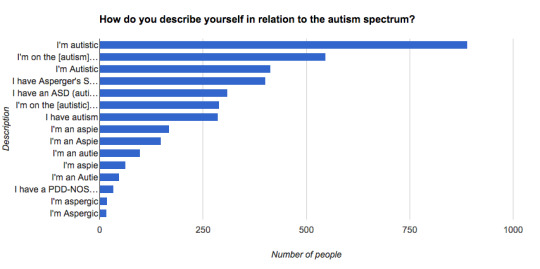
Generally, people preferred not to capitalise autistic, aspie, or autie. People preferred “autism spectrum” over “autistic spectrum”. Aside from that, people overwhelmingly preferred identity-first language - “I am autistic” rather than “I have autism”. The fourth most popular was Asperger’s Syndrome, which I thought was interesting, because my understanding was that it’s slowly being phased out.
The top 5 ways for us to describe ourselves were:
I'm autistic - 66.3%
I'm on the [autism] spectrum - 40.8%
I'm Autistic - 30.9%
I have Asperger's Syndrome - 29.9%
I have an ASD (autism spectrum disorder or autistic spectrum disorder) - 23.1%
It’s also worth noting that this question let you choose more than one answer, and lots of people chose both capitalisations. By this I mean that it was not uncommon for one person to choose both “I am autistic” and “I am Autistic”.
~
DIAGNOSIS
For this question, participants could again select as many as applied. I wanted to allow people to, for example, tell us that they had been formally diagnosed in childhood and self-diagnosed later - or that they had been formally diagnosed as a result of self-diagnosing and then being later diagnosed by a specialist.
While the survey was ongoing, I had a conversation with someone who was opposed to self-diagnosis and felt that it shouldn’t have been an option on the form. I didn’t feel I could remove it so late in the game, and anyway I knew that if it hadn’t been an option I would’ve had to process hundreds of people’s manual write-in “i’m self-diagnosed” submissions, so I left that option there.
But I also wanted to acknowledge that self-diagnosis is very context-dependent. The best I could think of doing that wouldn’t take an enormous amount of work was to split the results by all self-diagnosed people (including people who are formally or informally professionally diagnosed) and people who are only self-diagnosed.
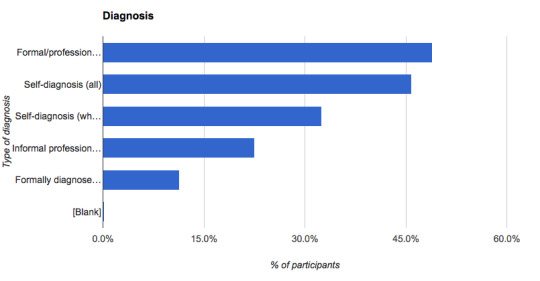
Here’s the numbers. Only two people didn’t answer this question.
Formal/professional/medical diagnosis - 49.0%
Self-diagnosis (all) - 45.8%
Self-diagnosis (where only this was selected) - 32.5%
Informal professional diagnosis - 22.5%
Formally diagnosed but not told about it at the time - 11.3%
~
PRE-DIAGNOSIS
I was curious about this because I know a few people who self-diagnosed before they were professionally diagnosed.
This question was single-choice-only, and there was no “other” box. About a third of participants didn’t answer at all - which matches the ~33% who are only self-diagnosed in the last question.
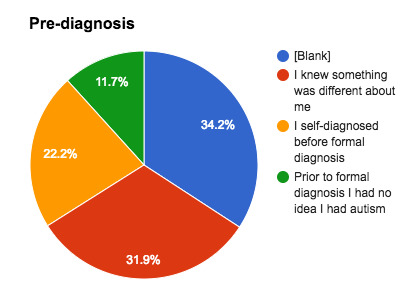
If I had more spoons I might look into whether age plays a part here. A friend of mine suggested that unless you have parents and/or teachers who’re very on-the-ball, you might have to work out what’s going on on your own, and that means that a lot of people might conclude that they’re autistic in their teens - around when a lot of kids are working out, for example, that they’re not straight.
~
AGE
Many graphs! Here’s the ages of all participants:
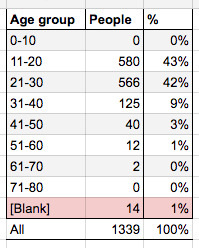
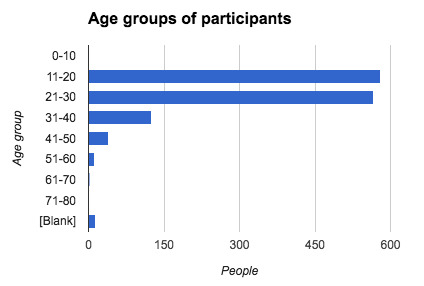
I feel I should very remind you here that this statistic shows how biased this survey is. This age graph is more representative of the ages of people who use Reddit, Tumblr, Twitter and Facebook than it is of autism in the general population by age.
This next graph is a bit more fun though:
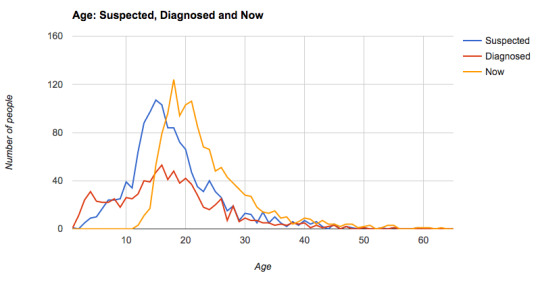
Age of diagnosis (red) is relatively spread out, because a lot of folks were diagnosed in childhood - presumably before they could work out they were autistic on their own, and instigated by parents who are a bit sensible and pay attention to how their kids are generally in life. The youngest age of diagnosis was 1, and the oldest 55.
You can also see how around the early teens people started to work out that something was up (blue), and there’s a corresponding bump in the red diagnosis line a few years later as those suspicions turn into formal diagnosis for a chunk of people - 22% of people in an earlier question knew that they were autistic before they were formally diagnosed.
Overall the yellow and blue lines suggest that most people worked out they were autistic, like, 3 years ago - in their early teens. And the red line suggests that a bunch of those people got a formal diagnosis soon after. There are a lot of people, about a third, who haven’t got a formal diagnosis, but perhaps this is not surprising - most participants were only in their late teens to early twenties when they took the survey. Since services and support for autistic people are so bad perhaps there’s not much advantage to getting diagnosed, especially if you’ve made it this far maybe not even knowing you’re autistic.
~
GENDER
My fave!
I’m sure a lot of you are aware of the anecdotal overlap between the trans/nonbinary and autistic communities. My gender identity clinic doctor, at the oldest gender identity clinic in the world, says that they see about ten times as many autistic people as are in the general population. And for a long time it was believed that autistic people were more likely to be gay - but now that being gay is more socially acceptable, the numbers are starting to converge. (I don’t have a source for this but I’d love one! If you’ve got it, throw it at me.) I’m curious to know whether there’s anything to suggest a similarity between the autistic-and-queer thing and the autistic-and-trans/nonbinary thing.
Again, this survey is very biased. It’s biased by age group and by the places participants came from, and the fact that it was a self-selecting sample on the internet. It would not be reasonable to extrapolate these figures to the general autistic population. On that note, here we go.
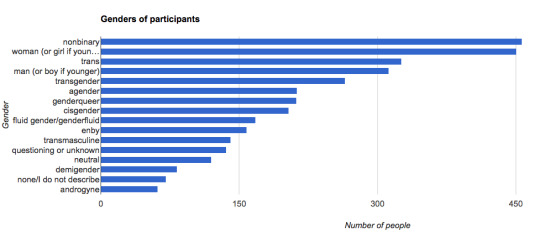
This is as many as I could fit onto the chart and still have all the gender labels showing. Here’s the percentages of the top 10:
nonbinary - 34.1%
woman (or girl if younger) - 33.7%
trans - 24.3%
man (or boy if younger) - 23.3%
transgender - 19.8%
agender - 15.9%
genderqueer - 15.8%
cisgender - 15.2%
fluid gender/genderfluid - 12.5%
enby - 11.8%
The low number of people identifying as cisgender is not as indicative as I first thought. It occurred to me that a lot of cisgender people wouldn’t describe themselves as such, and might not even know what it means. A lot of people whose genders differ from the ones they were assigned at birth also don’t relate to the trans/cis labels either.
The list of genders was taken from the annual survey of nonbinary people, which includes man and woman. I also added the three autism-related genders that I’ve ever heard of. There were a few comments in the feedback box by people who were annoyed by having to search through the long list for their gender; I’d guess around 5? But only two people skipped the question, so I’d guess the vast majority of people had no practical problems with it, even if a significant number of people may have disliked it. The wording of the question itself was taken from the results of a report from the Equality and Human Rights Commission, who found the following to be most inclusive: “Which of the following describes how you think of yourself?”
I was nosy about biases based on social networks, so I split the top 10 gender identities by social network:
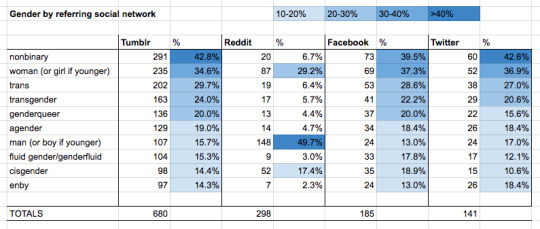
Reddit is notably less diverse, with a significantly smaller percentage than Twitter and Tumblr for every gender identity except cisgender and man/boy. The only reason I can’t say the same for Reddit vs. Facebook is because Facebook respondents were slightly more likely to say they were cisgender.
It’s worth noting that for Twitter there are only 141 responses, so the respondents here are likely only a few degrees of separation from me - and I am aware that my Twitter followership is mostly queer nonbinary people! (They’re only 10% of respondents though.)
I’ve run a few surveys of subreddit memberships in the past, and the percentage of nonbinary people is usually around 6-7% for the subreddits I tend to spend time in. (/r/bulletjournal, for example, and I ran one for /r/polyamory years ago but I have no hope of finding the URL of the results.) So it’s interesting to me that the autistic people of Reddit are just as likely to be nonbinary than the general population of Reddit.
The subreddits I promoted in were /r/autism, /r/samplesize and /r/neurodiversity.
~
SEXUAL AND ROMANTIC ORIENTATION
People could pick as many as they felt they identified with for both of these questions, and plenty picked more than one. For example, lots of people feel that terms like bisexual and asexual fit under the queer umbrella and could truthfully check queer and another term for one question.
The top five sexual orientations were:
asexual - 31.2%
queer - 30.3%
bisexual - 23.3%
pansexual - 18.4%
heterosexual - 16.8%
The top 5 romantic orientations were:
queer - 27.3%
panromantic - 25.1%
biromantic - 17.2%
heteroromantic - 15.2%
I don't know - 15.2%
This one I messed up a little. I regret not including “gay” and “lesbian” as checkbox options from the start; I added them at around 100 respondents, though earlier responses containing those words will still be counted in the stats. I also didn’t include “straight” at any point.
I only picked up on “gay” and “lesbian” because someone specifically said that they’re gay and they find the word homosexual to be really unpleasant, so they would have liked for gay to be added to the list. No one asked for “straight” to be included in the list, but a few people did write it in the “other” box.
A few people mentioned in the “other” box that I had missed demisexual and demiromantic off the list. If more than one person mentions a particular label I tend to assume that there’s a lot more who would check the box if it was there, so if I do this kind of survey again I will include them.
~
RELATIONSHIP PREFERENCES
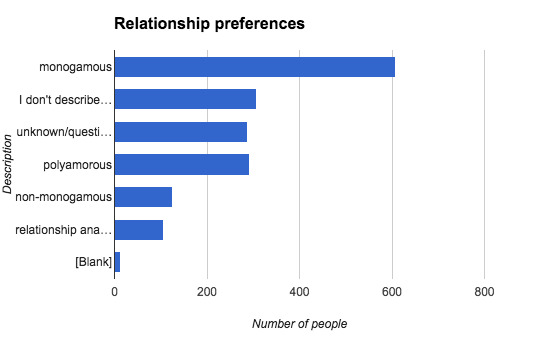
I have no idea how this compares to the general population or the Tumblr-Reddit-Twitter-Facebook population. But hey, it’s pretty cool, huh? Here it is in number form.
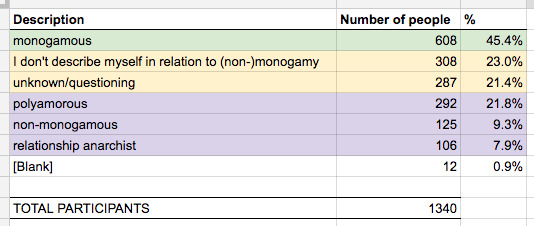
It started out being super non-monogamous, because I am non-monogamous and so a lot of my online circles are too. I could tell when the survey was making it out of my immediate circle, because at around the 300 participants mark it started to get a lot more monogamous.
~
LIVING SITUATION
I asked about current living situation and ideal living situation, and I’m thinking these figures are mostly representative of the fact that 85% of participants are between 11 and 30 years of age? I’m thinking as people get older they’re more likely to attain independence and an ideal living situation. But I’m not really sure!
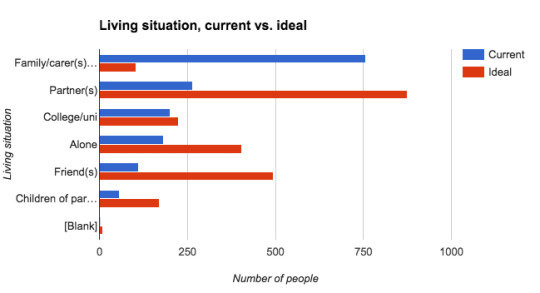
56% of people live with the family that raised them, and only 8% of them want to.
30% of participants want to live alone, but only 13% are doing so.
A little over a third of people would ideally like to live with friends, which I think is lovely and a very underrated and under-represented lifestyle choice!
And 20% of us live with partners, whereas 65% of us would prefer that. I wonder how many people living with partners would rather be alone, but it would be too much work for me to find out so there we are. Forever a mystery.
~
PERSON-FIRST vs. IDENTITY FIRST LANGUAGE
Identity-first language, as in “I’m autistic”. It acknowledges one’s autism as an inseparable part of one’s personality and sense of self.
Person-first language, as in “person with autism”. This seeks to define a person by their humanity rather than by their diagnosis.
I remembered that a while back the National Autistic Society in the UK did a survey and found that autistic people tend to prefer identity-first language. I was curious to see if my results would fit this, and they did - the majority of participants sometimes or always used identity-first language to describe their autism.
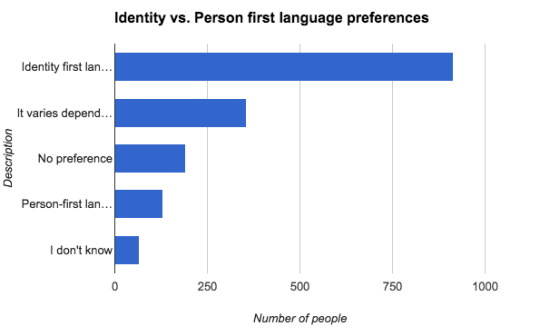
This was another question where you could select more than one answer, and there was an “other” box - but it’s very difficult for me to count those. Google Forms tells me 30 people selected “other”, but it doesn’t take into account the fact that some submissions were removed. If this number is accurate, then for perspective it’s less than half of the number who chose “I don’t know”.
~
DISABLED?
This question asked whether participants would describe themselves as disabled, in whole or in part due to their autism diagnosis.
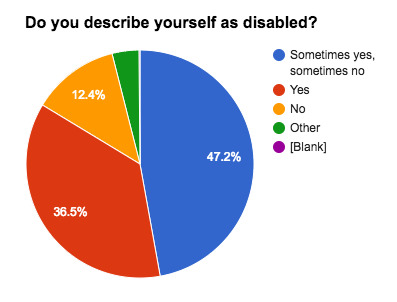
It seems that 83% of participants sometimes or always describe themselves as disabled due to their autism.
~
DESCRIBING OUR ASD-NESS
This one was a make-it-up-as-I-go question; for about 100 responses I’d put “disorder” and “condition”, because those were the only terms I could think of. After a few people had entered “neurotype” I added it to the list, and around that time I noticed a few people had put “difference” so I added that too. That means, I think, that over 1,000 people had all four options available to choose from.
Neurotype took the lead pretty fast despite being added after the start, and stayed ahead.
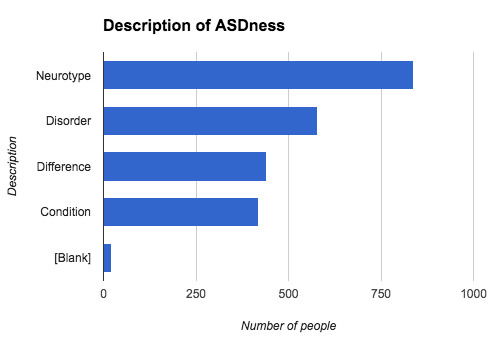
I can kinda imagine how this happened. Disorder is pretty negative, difference is a little condescending for a lot of people, and condition is a very medical-subtext word. They could all, depending on context, carry a less than implication. Neurotype, on the other hand, is a very neutral word. Autism is one of multiple neurotypes, alongside non-autistic, and probably other neurotypes. It puts autistic people on the same level as non-autistic people in terms of power and social status and mental health. It’s interesting, and I can see the appeal.
Again, this was a question that let you choose multiple answers and it’s very difficult for me to count the “other” answers, but Google Forms tells me it’s 146, around 11%. These included words like “disability” and “impairment”, and also terms like “my brain” and “a way of thinking”.
~
WHERE DID YOU FIND OUT ABOUT THIS SURVEY?
Again, a question that lets you choose more than one answer, and the “other” answers are hard to count, but Google Forms tells me it may be around 33, or 2.5%.
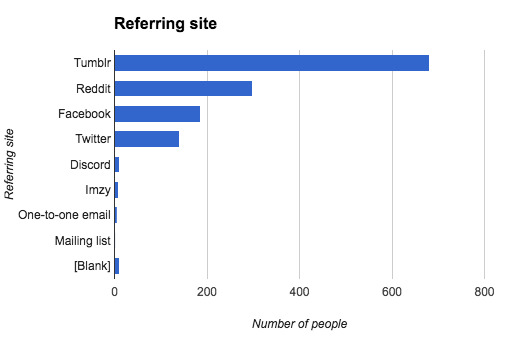
I feel like I’ve covered the stuff about diversity and bias regarding the social networks in sections above, so I don’t really have much to say here!
~
FEELINGS ABOUT AUTISM SPEAKS
This question was just thrown in there because it’s something I’ve always wondered. A lot of people are very angry-shouty about Autism Speaks. Is this the prevalent opinion, or does it just seem that way because of the aforementioned angry-shoutiness?
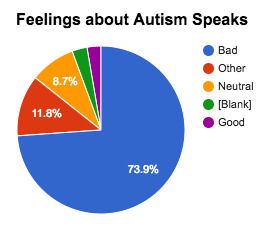
That’s a yes, most people did not feel good about Autism Speaks. And it’s worth noting that I listed the “other” answers in the spreadsheet because wow.
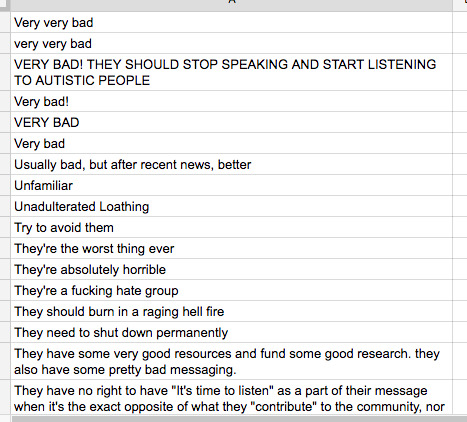
People skipped having their vote counted as merely “bad” in order to vent some pretty visceral feelings here.
~
OVERALL SUMMARY, THOUGHTS ETC.
Well, erm, I don’t really know what to say here. We are autistic and we use social networks, I guess? This was a lot of fun for me, and I hope the results are interesting for you too!
I threw this form together hastily, and that probably shows; I think I would be more thoughtful about the wording next time. I also used Google Forms, which is great and accessible and freeeeee but it does have some limitations - mainly in counting the “other” entries and not adjusting its Forms-associated summary graphs when I delete troll or duplicate entries. This is fine, it just takes more time and energy to get the blog post graphs and numbers to be helpful.
So yeah! Thank you for taking part, if you took part! And if you’d like to be notified of a future autistic survey that I may or may not run, please feel free to put your email address here. :)
637 notes
·
View notes
Text
Questioning
I just watched a video by QueerAsCat about questioning, and how no one ever talks about it in the moment, and it’s seen as a transitional phase that has a start and end, at which point you’ve moved from A to B and you never talk about that time you thought you were/were A. This is about the safest place for me to get all this out there, since I don’t have many followers, and I’ll ask the one person who does know me personally to just never speak of it here or on any other platform unless I start it, OK? OK, here goes. For the past year and a half, I’ve been masquerading around as someone absolutely sure that she’s a cis woman. When I started dating my spouse, we talked about how we identified, and I was like 100% woman, no doubt, you can even call me a lady, it’s all my own definition of femininity. But somewhere around the time I was looking for my wedding dress, I lost my gender. Everything felt bad. Expectations around how I was supposed to feel about finding my dress and seeing myself in it and all the other “bridal” things refused to manifest. Part of that was because I was preparing for my wedding in a foreign country where my best friends and family couldn’t do these things with me. I tried not to be sentimental about it, but it was painful. But there was something else. Not that I didn’t want to wear a dress, but there was something incongruous about the “bridal” connection to it, the feminine inhabitation in clothing, specifically as it related to me. I started to get more and more agitated when shopping, not just for wedding clothes, but any clothes. My spouse is trans non-binary. They are starting hormones now, and it’s something I’ve been dreading. With feelings like that, I must be a standard transphobic cis person right? But it’s not just the fear of change and the fear of threatening masculinity. It’s that I can’t talk about how I lost my gender, and all the feelings that are going on personally, because I don’t understand those things. I don’t understand masculinity and femininity or what it’s like to be desperate for someone to see you as a gender that as a western concept hasn’t caught on, so there’s not a lot of hope. I didn’t even think I wanted to change my name or pronouns. So even though I don’t have a gender, I’m definitely not trans. Those aren’t the only reasons. Partly, I just don’t care about being misgendered, I care about being gendered, being told I can’t do something, or I have some secret knowledge because of my sex. A non-binary friend described themselves as “politically female” because things that we think of as “women’s rights” still applied to them, and I think I’m comfortable with that identity. I’ve also been going with queer and bisexual for a while now, but I’m also toying with terms like lesbian and dyke, even though I’m the farthest from butch (and femme, for that matter) that one can be. I’m a caregiver, and one of my residents recently died very suddenly. It was traumatic in a way that no other death has been. I cry at work still, a month later, and I have literally woken myself up crying huge terrible sobs. All that emotion, combined with the start of my spouse’s self-medication, has brought my anxiety around my identity right in front of my face, every once in a while lunging at me and saying “What are you going to do about it?” I scroll through pinterest flailing around because I don’t know the terms for the look I’m looking for, and usually leave TRAID in a panic because I just can’t find anything that’s right. I’m not even sure that changing my style of dress will solve anything. When I search for “living genderfree” I get results for raising children and fashion, both of which seem to mostly involve dungarees, and neither of which I’m really interested in. I want to know how to move through life without being tied to the gender I was/am assigned. I’m constantly carrying around anxiety about whether I should come out, when I feel like I’m only halfway there, and no one will understand it. No one even uses the pronouns that I like the most, so I’m afraid that people will laugh at me. I used to go by the name Dusty when I was in college. It was my username, I moved, and just started introducing myself to people without reference to my other name. I stopped when a professor was rude about it during the first role call. “I’m not EVEN going to ask,” he said. I was so embarrassed, I went back to my given name. I’ve thought about asking people to call me that again, and we were going to move back to America, and now we are looking at being in London for another 5 years at least. It feel like my life will never start. I think that most people who talk about living authentically are full of shit, and it’s not like I’m hiding anything, and it’s not like i want to “open a conversation” about it, but I just wish things were different, easier. So that’s it. I think I’m agender, or maybe GNC, but it’s more like gender doesn’t conform to me. I’m not trans, and you don’t have to convince me I’m “trans enough” or that I’m still under an umbrella, because some of us just want to get wet, OK? I don’t need reassurance that I fit, because the thing is that I don’t, and that’s fine. I just wish I had other people to talk to about it, desperately. I’ve joined groups and chats and downloaded hours of non-binary podcasts, and I NEVER listen to non-fiction podcasts, but I’m desperate to hear from someone like me. Putting it out there
0 notes
Text
What is a Witch?
By: Beth from Little Red Tarot
Everywhere I look right now, I see the word ‘witch’.
These references come in all kinds of contexts: Religious witches in the tarot community sharing their practice. Black girl magic, bruja magic, Wicca, folklore, gods and goddesses, superstition, spells and herbalism from so many cultures. Witchy ‘lookbooks’ on high-end websites. Feminists, queers and activists reclaiming the identity of the persecuted outcast and the edgewalker. Newcomers finding something of themselves resonating with rituals and altars and the language of magick.
The list goes on. Witches are everywhere.
So…what is a witch? What does it mean to claim this identity?
Obviously, there’s no one answer to this question. There are as many ways to be a witch as there are ways to be a person – that is to say, an infinite number. It’s a topic worth exploring, so I spoke to three women who identify with the word ‘witch’, to find out more about what that word means to them, and how it looks in practice.
Not only was it fascinating to read about the diverse ways these witches practice, but also to notice the commonalities in their stories, too. Themes of ancestry and lineage, altar work, candle magic and most interestingly, the urge to forge personal paths which may diverge from tradition came through in all stories (and in others I’ve had recently which are not shared below).
I love how these small windows into three different women’s practices illustrate the diversity within the witch community, but also the threads that connect magical folks from different roots.
Bri Luna, The Hoodwitch
“What is a witch?”
You know whenever I’m asked this question I laugh a bit because I know that there isn’t a “one size fits all” answer to this question. However, being a witch means more to me than just spells and candles. To me, it means freedom. The power to embrace nature boldly and unapologetically, to heal yourself and your community. We respect the seen and unseen realms. It is truly the freedom to be your most authentic self. To embrace ALL aspects of whoever that may be, and fiercely that is a Witch.
I was born into a family of powerful women. Both my maternal and paternal grandmothers were healers and what many would call “brujas”, one is Mexican and the other is a very Southern black woman. Magic, is in my blood. As a child, I dismissed some of their practices as being “old fashioned”, or superstitious. As I learned more about these practices over the years, I began to tap into their wisdom, and I realized that the practices of my grandmothers were truly gifts from our ancestors.
From as far as I can remember, I’ve always been drawn to the things that most would consider magical or mysterious. My earliest childhood memories are of holding stones and crystal filled geodes, watching my grandmother use fresh herbs from her garden, or filling up glasses of water for her boveda, sprinkling brick dust for protection around her home. I mean, these were very common things seen around the home. They both worked with herbs for cleansing, and of course candles. Growing up in Los Angeles, CA I loved seeing all of the colorful candles and religious imagery in the botanica windows of south Central. The smell of agua de florida is nostalgic for me and comforting. I’ve always felt the most comfortable in environments around people who also embraced the unseen and the mysteries of life.
Being a very sensitive child, I had an inner knowing and FEELING that something else existed beyond our physical senses. As a teen, I began to really study books on witchcraft & traditions from around the world. I loved the tarot, and I was quite rebellious. I didn’t like the idea of organized religion or following on a more traditional path like some of my family and friends. However, as an adult, I see the appeal in more traditional practices, there is structure and a great sense of community and wisdom. I don’t criticize anyone who chooses to go down a more traditional path but I prefer the unconventional. I enjoy applying that which I deemed “old fashioned” as a child, for our world today. I’ve also learned from practitioners and healers from an array of paths. I feel that certain practices just resonate with us, and those are the ones we should keep.
I create and share rituals based on lunar phases i.e The new and full moon rituals for my business’s website (thehoodwitch.com). I also share rituals and articles around the changing cycles of the seasons, and for special occasions like birth and death. Mostly, I create from intuition, from the minerals or the herbs that I work with. I’ve learned to trust myself fully when it comes to magic, and that is what I hoped to help inspire within others, it is my driving force for my business, The Hoodwitch. In the last three years we have grown immensely. It started with just me, and now I have an amazing team of witches. We have astrologers, healers, and tarot readers that contribute to the site. They each bring something special, we all come from different paths and practices. While I am a solitary witch, I enjoy community building and really creating meaningful rituals. I am grateful every day for the ability to share my magic, passion, culture, and creativity with the rest of the world, and to those who are receptive. I’m always Grateful for my ancestors, and guides who continually encourage and empower me to be the best that I can, To keep going, and inspiring others to find their voice, vision, and path.
Find Bri Luna at her website: The Hoodwitch
Thorn Mooney, Wiccan
Hi! I’m Thorn, and I’m Wiccan.
I sometimes hesitate to announce that in magical spaces, because Wicca seems to be getting kind of a bad rap lately. We had our heyday at the end of the 20th century, and now that so many other kinds of Craft are openly available, I hear a lot of talk about Wicca being like “training wheels” for new witches, or that we’re all about cultural appropriation, gender binaries, or a head-in-the-sand emphasis on “love and light” at the expense of real substance. Wicca is “witchcraft with no teeth,” I hear. I say that I’m Wiccan, and increasingly I seem to get written off. People think they already know what I’m about.
There’s plenty of precedence to justify that, of course. For so long, when contemporary Pagans and magicians would talk about “witchcraft,” they meant “Wicca,” and other kinds of practitioners would essentially be erased. And – let’s be real – early forms of Wicca had plenty of problems that needed to be tackled by thoughtful, socially conscious, theologically engaged practitioners (my first copy of Gardner’s The Meaning of Witchcraft has mashed corners from being thrown across the room more than once). I think that’s happening, and I’m proud to be a part of it. And thanks to the publication of lots of new books and the growth of the Internet, more of us have a better handle on the reality of things: witchcraft is a big, varied category that means different things to different people. That’s fantastic! But somewhere along the line we forgot that Wicca is, too! People think they know what my Craft looks like, but they’re usually pretty off-base.
So hi! I’m Thorn, and I’m Wiccan. Specifically, I’m Thorn of the Wica. I’m a Gardnerian priestess, and I run a traditional coven in the American South.
The solitary, eclectic Wicca that so many of us first encountered when we began exploring witchcraft is actually a relatively recent development in Wiccan history. In the 1950’s through 1970’s, most Wiccans practiced in secretive, initiatory covens that could trace their lineage to Gerald Gardner and one of his high priestesses. The names of the gods were secret, the specific rites were secret, and part of what it meant to be “of the Wica” was belonging to a community of witches united by a shared history and praxis. Other kinds of Wicca came to the forefront in the 1990’s, but traditional Wicca never went away. I’ve made a sacred commitment to preserving those traditional ways for new generations of Wiccans. That’s a cornerstone of my witchcraft.
For me, being a Gardnerian means being part of a family. I have my own solitary practice, my own way of serving our gods and practicing magic, but I also have a close network of other witches who I know can relate directly to these very personal experiences. Lineage isn’t just about being able to say you’re related to so-and-so; it’s a magical current that members can tap into to aid their own Work. It means a constantly growing body of oral lore and a kind of ritual power that is unique to group practice.
My experience has been that a lot of people think being a traditional Wiccan entails getting bossed around, sacrificing your individuality, and then parading around like you’re better than Wiccans who aren’t initiated into traditional covens. That’s not how we roll in my family. Gardnerian Wicca provides us with a framework and a series of effective techniques – what I think of as a toolbox – but I still get to grow and explore as I feel called. My own high priestess always expected and encouraged me to pursue a path that was uniquely mine. She’d say, “I don’t make witches. You come in as a witch. What I do is make priests and priestesses of this tradition.” I made a commitment to our gods and our traditions because they felt like home to me, not because anyone made me. And I certainly don’t believe that makes me better than other kinds of witches. Our way isn’t for everyone, and it never has been. That’s okay. As for the secrecy, well, that’s about magical power and the sacredness of oathmaking. Not elitism. Silence has long been an occult virtue because of the power it generates. Snobbery is a choice that some people make, but it’s optional.
I was drawn to traditional Wicca from the beginning. I loved the old black-and-white pictures of early high priestesses. I loved the idea of being part of a magical order. I loved that I could practice something that had crossed generations or witches. I practice this way because it works, and because these are the gods that call me.
Hi. I’m Thorn, and I’m Wiccan.
Find Thorn at her blog: Thorn the Witch. She also writes about tarot at The Tarot Skeptic.
Mey Rude, Writer and Bruja
My practice is heavily influenced by my Mexican ancestors. I have relatives who can talk to ghosts, others who can predict pregnancies and a family full of Mexican women who have been taking care of their children and communities for generations.
In my practices I connect to them and to the faith and beliefs that they had long before I was born. I pray to Santa Muerte and La Virgen and give them offerings, I light candles and put spells in them. I build shrines using memories and crystals and symbols of the divine Brown Femininity that I worship and that my mother and grandmother and great-grandmother and so on have passed on through each other. Becoming a witch has helped me connect with the women in my family in a way that I never would have been able to any other way.
I call myself a bruja, a Mexican witch, as a way to honor my heritage but also queer it. I take tools and prayers and traditions from Mexican folk Catholicism, and I queer them, I focus on the femininity, I worship Santa Muerte, the holy death who sees us all as equal because no matter if you’re an altar boy, if you’re gay, if you’re trans, if you’re a sex worker or a criminal or a priest, we all die. I ask her for protection for my loved ones and for justice on those who want to harm my loved ones. I give her offerings at her altar (she seems to love peanut m’n’ms). I say my spells three times in a nod to the trinity. I do spells using candles with La Virgen and the saints on them and others using spells with pop stars like Beyonce or Carly Rae Jepsen on them. I combine these practices that I learned from my family with new things I’ve learned, like using crystals and tinctures I get from friends.
One of the simplest spells I do is carry a small image of La Virgen with me everywhere I go, and when I’m especially nervous, I hold onto it, reminding me that she’s the Queen of the Americas and that she’s always watching over me and that she loves me.
Read Mey’s writing on Autostraddle (including her awesome and eclectic Witch Hunt column!)
Are you a witch? What does your identity mean to you, in theory and in practice? Please share your thoughts in the comments!
The post What is a Witch? appeared first on Familiar Territory.
from What is a Witch?
0 notes